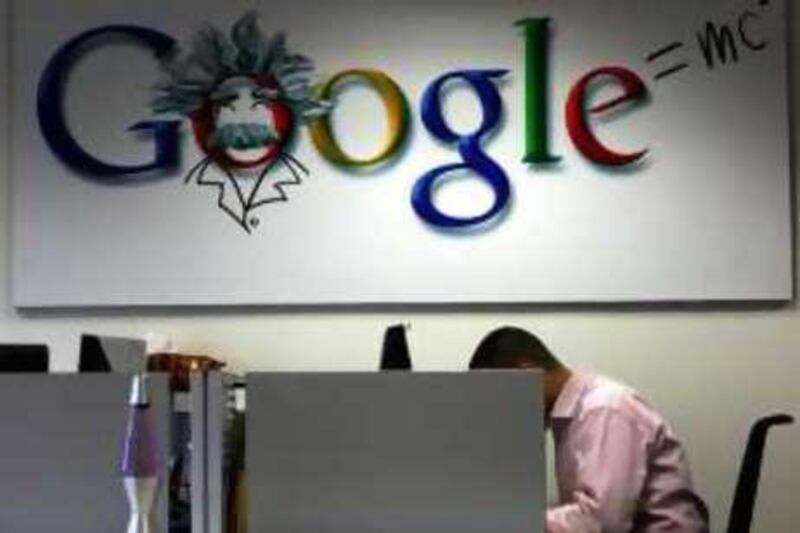The search empire puts its imprint on a corner of Dubai, as Nour Malas discovers.
If there is one place on earth besides Mountain View, California where the quirky cool of Google's office culture might work, it could easily be Dubai. The Googleplex - the company's 111,000 squared-metre corporate headquarters - has a sand volleyball court; Dubai has indoor ski slopes. The Googleplex has a full-scale replica of SpaceShip One; Dubai has a replica of the world made out of islands. The world's fastest-growing city and the world's most powerful brand share a reverence for innovation and speed.
"Are you sure no one wants snacks before we start?" Some 15 journalists are huddled around a rug on multicoloured bean bags for the first-ever Google Day at Google's recently-opened office in Dubai's Internet City (it moved from Emirates Towers in September). Those who ask questions are rewarded with Google pins that flash like disco strobe lights. There are questions on censorship, local community initiatives and search engine localisation in the Middle East. Few seem particularly enthused to be sitting amidst a hodgepodge of Google paraphenalia and local cultural signifiers like smiling stuffed camels and shisha pipes.
Whiteboards bearing giant doodles of the Google logo are strung together across an entire wall. There's a Nintendo Wii and an exercise ball. A foosball table and a red couch in one corner overlook the palm trees of Dubai Internet City, and a 42-inch television screen at the entrance cruises through Google Earth's world landscapes. The office is one open spread, except for two breakout rooms - Room Aladdin and Room Sinbad - with frosted palm trees etched into their glass panes. There used to be a second entrance to the office, but the staff tacked the door closed. In its place? A dart board.
"It all looks very Googly," says Ahmad Hamzawi, the company's manager of engineering for the Middle East and North Africa (MENA). "The red colours, the Google frames, the doodles - I think it's phenomenal. The culture kind of permeates, wherever you are." His colleague and co-presenter Chewy Trewhella looks as you expect a Googler to look: tall, tousled hair, collared shirt over a long-sleeved tee (both striped in mismatched directions and colours). Hamzawi is based in Zurich ("In the Zurich office, there's a slide between the second and first floor. I'll be having lunch on the first, watching people sort of stumble out of the slide"). Trewhella is based in London. Both flew into Dubai for today's presentation.
As any Googler will explain, "based in" is a relative term at the company these days. "We don't need to be fixed anywhere," says Joanne Kubba, Manager for Global Communications & Public Affairs, MENA. Kubba has been the woman in charge of importing Google culture in the Emirates, and "it's all about fluidity," she says. Every employee here has a PC and a laptop with a dock, meaning that people coming in from offices around the world can dock their laptops, connect to a printer, and proceed to work almost as quickly as Google returns search results.
Work in the Dubai office is focused on improving Google's search capabilities in the Arab world. So far, Google has localised domains (like google.ae) in nine MENA countries. The company recently launched Google Ta3reeb, which facilitates Arabic searches with an English keyboard. Arabic was the second language enabled for Knol, a Google tool for sharing user-generated articles. Knol Arabic was made possible by the company's "20 per cent time" policy, which lets employees allocate 20 per cent of their work hours to self-directed projects of personal interest. An Arab engineer in Mountain View used his 20 per cent time to roll out Knol Arabic right after the English original. In the pipeline is a method to refine Arabic searches that may yield more meaningful results in English by searching in both languages and instantaneously translating relevant English results into Arabic.
Kubba is particularly proud of the localised names of the Dubai office's two printers: Ibn Sina and Ibn Batuta. "We wanted visitors from outside to learn about the Middle East," she says. The hope is that when someone connects to a printer here and reads its name, they'll be compelled to, well, Google it. The video conferencing room - which Kubba uses four or fives times a day - is called Sinbad. Apparently, people in the London office love it. "Whenever they add me on VC," she notes, "they say: 'Oh, that's so cool!'"
"It's about fostering an environment that's un-intimidating and unassuming," says Kubba. She seems to have succeeded. As Hamzawi notes: "Nothing really feels different, except for a time-zone difference."





